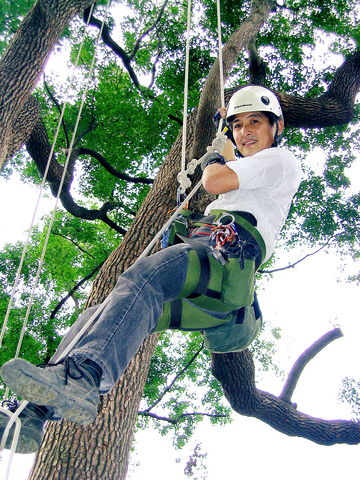For most retirees, earthbound leisurely pastimes such as golf or hiking are great ways to unwind. Retired photojournalist Elliot Su (
Dangling from a thick rope 60m above the ground with no safety net may not be everyone's idea of fun, but for Su and other members of the Tree Climbing Taiwan Association the view is always greener from the top of a towering Taiwan redwood or Japanese cedar.

PHOTO: GAVIN PHIPPS, TAIPEI TIMES
Su said that from the top of a tree you're able to get a different view of the world. "There's nothing quite like being able to see birds and insects close-up and in their natural environments," he said.
Su first became interested in the pastime after he picked up a tree-climbing magazine while holidaying in the British seaside resort Eastbourne.
He contacted the US-based association Tree Climbing International and within a few months was in Atlanta, Georgia, studying under the guidance of tree-climbing guru, Peter "Treeman"
Jenkins.
After three months extensive training, Su became a certified member of Tree Climbing International and Taiwan's first tree-climbing instructor.
Since founding the Taiwan chapter of Tree Climbing International just over a year ago, Su has taught over 1,000 recreational climbers and worked in close conjunction with universities, environmental groups and government bodies as well as charity organizations.
In order to qualify as an expert tree climber, students have to undertake a three-day extensive course focusing on the intricacies and techniques need to master tree climbing, and then must climb 25 trees of 10 different species. The course has not been adapted in any way and complies to the guidelines laid down by Tree Climbing International.
Tree climbing is not cheap and while the association loans equipment to its students, graduates wanting to go it alone have to purchase equipment specially imported from the US. Even with this equipment, which costs upwards of NT$20,000, climbers' safety is not guaranteed. Neither Su nor any of his students have fallen from a tree, but tree-dwelling creatures have attacked the tree-loving, tree-climbing retiree.
"I was trying to remove a bee's nest from a tree so that we could take a class of children up. The entomology students told me that bees don't attack after dark, but this proved incorrect," Su said. "I'd climbed into the tree and was about to remove the nest when I was stung by a single killer bee."
Within minutes of the accident Su's hand had, according to the tree-climbing expert, "turned into bread" and swollen to twice its normal size. As a result of the bee sting, Su was kept in hospital for three days, pumped with drugs and kept under close observation.
While Su and his fellow climbers ask permission before climbing any tree, be it in Wulai, Nantou or Hualien and currently only undertake inner-city climbs in a couple of Taipei parks, he does have his eyes set on a nice tree-lined stretch of downtown Taipei.
"I'd love to climb the trees along Dunhwa North and South roads. I think it would be great fun and because of the public nature of such a climb, it would be great way to introduce tree climbing and encourage people to take more notice of Taiwan's natural environment," he said.
For further information about the Tree Climbing Taiwan Association, log on to its Chinese-language website at www.treeclimbingtaiwan.org. Those interested in taking to the canopies can contact the association directly by calling (0936) 888 997 or by fax at (02) 2391 8145. Class times and other information can also be obtained via e-mail at boysu@yam.com.

In the March 9 edition of the Taipei Times a piece by Ninon Godefroy ran with the headine “The quiet, gentle rhythm of Taiwan.” It started with the line “Taiwan is a small, humble place. There is no Eiffel Tower, no pyramids — no singular attraction that draws the world’s attention.” I laughed out loud at that. This was out of no disrespect for the author or the piece, which made some interesting analogies and good points about how both Din Tai Fung’s and Taiwan Semiconductor Manufacturing Co’s (TSMC, 台積電) meticulous attention to detail and quality are not quite up to

April 21 to April 27 Hsieh Er’s (謝娥) political fortunes were rising fast after she got out of jail and joined the Chinese Nationalist Party (KMT) in December 1945. Not only did she hold key positions in various committees, she was elected the only woman on the Taipei City Council and headed to Nanjing in 1946 as the sole Taiwanese female representative to the National Constituent Assembly. With the support of first lady Soong May-ling (宋美齡), she started the Taipei Women’s Association and Taiwan Provincial Women’s Association, where she

Chinese Nationalist Party (KMT) Chairman Eric Chu (朱立倫) hatched a bold plan to charge forward and seize the initiative when he held a protest in front of the Taipei City Prosecutors’ Office. Though risky, because illegal, its success would help tackle at least six problems facing both himself and the KMT. What he did not see coming was Taipei Mayor Chiang Wan-an (將萬安) tripping him up out of the gate. In spite of Chu being the most consequential and successful KMT chairman since the early 2010s — arguably saving the party from financial ruin and restoring its electoral viability —

It is one of the more remarkable facts of Taiwan history that it was never occupied or claimed by any of the numerous kingdoms of southern China — Han or otherwise — that lay just across the water from it. None of their brilliant ministers ever discovered that Taiwan was a “core interest” of the state whose annexation was “inevitable.” As Paul Kua notes in an excellent monograph laying out how the Portuguese gave Taiwan the name “Formosa,” the first Europeans to express an interest in occupying Taiwan were the Spanish. Tonio Andrade in his seminal work, How Taiwan Became Chinese,